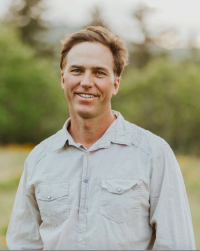In the Latest Edition of River Currents, We sat down for Conversations with Brent Foster, Former Executive Director of Columbia Riverkeeper
Brent Foster served as an attorney, and later executive director, for Columbia Riverkeeper. While Riverkeeper’s executive director, Brent prosecuted lawsuits against industrial polluters to stop illegal toxic pollution and advocated for new laws to increase testing for persistent bioaccumulative toxins.
Riverkeeper: What attracted you to Columbia Riverkeeper?
Brent Foster: I started working with Riverkeeper almost straight out of law school. I was drawn to the environmental enforcement angle using the Clean Water Act to hold polluters accountable, which the State of Oregon wasn’t really doing at the time. For a long time there was a pretty big split among organizational groups—some focusing on litigation and others on community outreach. What makes Riverkeeper great and successful is tying both components together, and doing them really well.
Riverkeeper: Can you share a favorite memory from the early days of fighting liquefied natural gas (LNG) terminals and pipelines in the Columbia River estuary?

Brent Foster: I remember when the LNG terminals were just starting and we had identified that the pipelines were going to cross thousands of landowners' properties in rural areas of Oregon and Washington. The opportunity to organize with those rural landowners, farmers, and loggers was really memorable. When it started out, it was hostile; we were environmentalists and we were not the “good guys.” We flew a group back to DC to protest a public-stock offering with one of the LNG companies and I ended up sharing a room with the local head of the NRA from the Longview area. This work creates unique situations that bring together people whose paths would never cross otherwise. Both he and his wife ended up being fantastic advocates, and really instrumental in helping to stop LNG. Those types of stories are what make this super fun.
Riverkeeper: In 2005, the Oregon Dept. of Environmental Quality (DEQ) tried to weaken the state’s water clarity standards at industry’s behest. How did Riverkeeper respond and did it work?
Brent Foster: Industry did not like the water quality standards and we thought they were not strict enough. If Riverkeeper filed a 60-day notice with intent to sue a polluter, DEQ was essentially coordinating with the polluter to issue weak enforcement notices, which would basically cancel lawsuits. This was a made-for-TV-issue. We went down to the front steps of DEQ with moms holding baby bottles of dirty water and we had bridge protests, relying on TV and newspapers to reveal the issue. Eventually DEQ reversed course. It was a combination of Riverkeeper’s membership, a good board of directors, and public organizing that allowed us to take risks.
Riverkeeper: Fifty years after The Dalles Dam inundated Celilo Falls, Riverkeeper partnered with Celilo Village in 2008 to create a photo exhibit honoring the mighty falls and the people who fished there. What are your memories of that experience?
Brent Foster: The flooding of Celilo Falls probably goes down to me as the most dramatic and regrettable single assault on the Columbia River and the Native Americans who call it home. (Of course, it has a lot of stiff competition from Hanford and all of the other dams.) Celilo Falls was at the epicenter of Native American trade, culture, and commerce, with a fantastic fish run with salmon and steelhead that could leap up the falls in dramatic display. Destroying this place is hard to overstate.
The 50th anniversary was a chance to look back, working with tribal members to pull together historic photos. People were literally pulling photos from shoeboxes that hadn’t ever been public. It was really fun to put together. We started the grassroots exhibit at the mouth of the river and it traveled nearly all the way to the headwaters. It was a powerful way to remember what was there—and quite frankly, what is still there, underwater.
Riverkeeper: Reflecting on your time as executive director, what are you most proud of?
Brent Foster: I am so proud of everyone who came after me to grow Riverkeeper. When I started, we were working out of a one-room office with just me and a couple of part-time staff and literally a couple weeks of operating budget. No group that I’ve worked with before or after has done as much in terms of the size of the threats and the sheer number of wins. Taking down multi-billion-dollar companies with a small grassroots organizing campaign with a $1 million annual operational budget—and win? It’s just incredible, and that is a testament to the current leadership.
Riverkeeper: What do you think other people should know about Riverkeeper?
Brent Foster: Telling the stories of victories and the projects that Riverkeeper has stopped over the years is important because we are in the middle of a climate crisis. An exciting project that stands out to me—and that Riverkeeper supported from early on—is the Portland Clean Energy Fund. This plan is quite possibly the largest amount of money per-capita to transition to clean energy anywhere in the world. This is a model for the country. While the nuts and bolts are being developed right now, it has the opportunity to transform how development is done, and it will be exciting to see how it plays out given the pandemic and the opportunity to create our new “normal.”
Riverkeeper: What are you up to these days?
Brent Foster: I’m a parent and I do green building. We build straw-bale houses and high-efficiency homes. After 20 years of litigation, it was time to explore my hobbies of carpentry and building. I’ve still got my finger in the Portland Clean Energy Fund, as well as working with other cities doing similar energy efficiency work. I also work on ballot measures. Most recently, I worked on stopping Nestlé from gaining access to Oxbow Springs in Cascade Locks.
Get inspired by the last 20 years of impactful work in solidarity with local and regional heroes of our movement.


